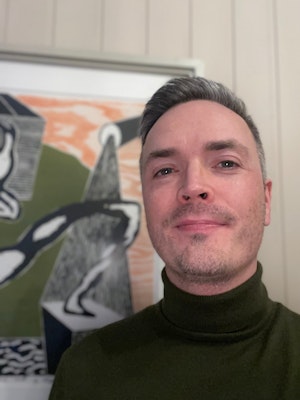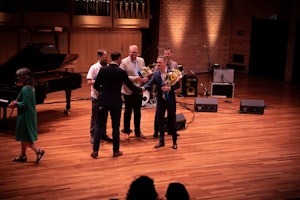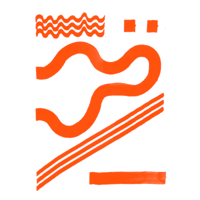Keep up with the «Stipendiatstafett» series! Here, you'll get to know former PhD candidates from NMH, their projects, and what they work with today.
What are you up to now, Ville Langfeldt?

Ville earned his PhD at NMH in 2022 and has just become Head of Department at the Faculty of Performing Arts at the University of Stavanger (UiS).
Tell us about your project
I defended my dissertation in December 2022, completing a PhD in music pedagogy: Holistic identification of musical harmony. A theoretical and empirical study.
The project focused on harmonic listening. More precisely, it explored how expert listeners are able to identify chord types instantly and without analysis, much like how most of us can immediately recognise the voice of a close friend on the phone or the smell of freshly baked buns.
The dissertation examines how the ability for so-called holistic harmonic identification works and whether it is possible to train this ability consciously. Unlike the existing literature on the subject, I conclude that it is most certainly possible – and I even present concrete strategies for doing so.
Why did you choose to pursue a PhD?
I chose to pursue a PhD because I wanted to qualify for a permanent teaching position.
– Don’t spend three months reading about micro-phenomenology. You won’t need it, 2018-Ville!
former PhD candidate, to himself 7 years ago
What happened after completing your doctorate?
After finishing my PhD, I took some time to reflect on what I wanted to do in life. I completed my teaching responsibilities at the Norwegian Academy of Music in the spring of 2023 and continued working with film music.
I explored possibilities for further research, made a connection with Northwestern University in the USA, and began preparing a funding application for a research stay there.
At the same time, I had grown somewhat disillusioned with academia and was uncertain whether I wanted to invest even more years in an unpredictable life as an academic freelancer. I was approaching 40, so there might have been an element of a good old-fashioned midlife crisis in it as well.
Combined with events in my ownfamily, I ultimately decided to accept a position as Head of Department at Alta videregående (upper secondary school), where I myself attended the music programme years ago.
It was an unexpected turn of events, both for me and those around me, but it turned out to be a good choice.
What is the most important thing you’ve learned from doing a PhD?
The most important thing I’ve learned from completing a PhD isn’t what’s written in the dissertation’s conclusion, but rather the skills you develop through the process of working on an academic PhD:
Truly delving deep into a specific issue and subject area. Managing large amounts of information. Achieving precision in conceptual and linguistic expression. Gaining the confidence to challenge established academic truths when you can argue rationally that they are incorrect or outdated.

What are you doing now?
My time in Alta was an incredibly educational and rewarding experience, with fantastic colleagues. Then, out of the blue, a position opened up as Head of Department at the Faculty of Performing Arts at the University of Stavanger (UiS), with responsibilities for jazz, dance, teacher education (PPU), and music production.
Although the timing wasn’t ideal, this seemed like a unique opportunity to combine leadership with my academic background in jazz, music pedagogy, and music production, within an institutional environment I am familiar with. I started in the Stavanger position in August 2025.
– Being a PhD candidate can be both fantastic and utterly dreadful – sometimes simultaneously. Choose a topic you are genuinely passionate about!
former PhD candidate
What would you say to yourself as a first-year PhD candidate?
If I could say something to myself as a first-year PhD candidate, I would point to research showing that the vast majority of PhD candidates experience impostor syndrome.
It’s completely normal to feel as though you’ve been given an opportunity you neither deserve nor are equipped to handle. But remember, NMH selected your application among many others because they believe in you and your project.
I might also warn 2018-Ville not to spend three months reading about micro-phenomenology. You won’t need it!
What career advice would you give to current or prospective PhD candidates?
I’d probably refrain from giving outright career advice, but for those considering applying for a PhD position, I would say this:
Being a PhD candidate can be both fantastic and utterly dreadful – sometimes simultaneously. You are given an extraordinary opportunity to immerse yourself in something, but that «something» will, at times, seep into every part of your life and consciousness – your free time, family life, even your dreams.
It does pass eventually, but to sustain yourself for three years: choose a topic you are genuinely passionate about!




